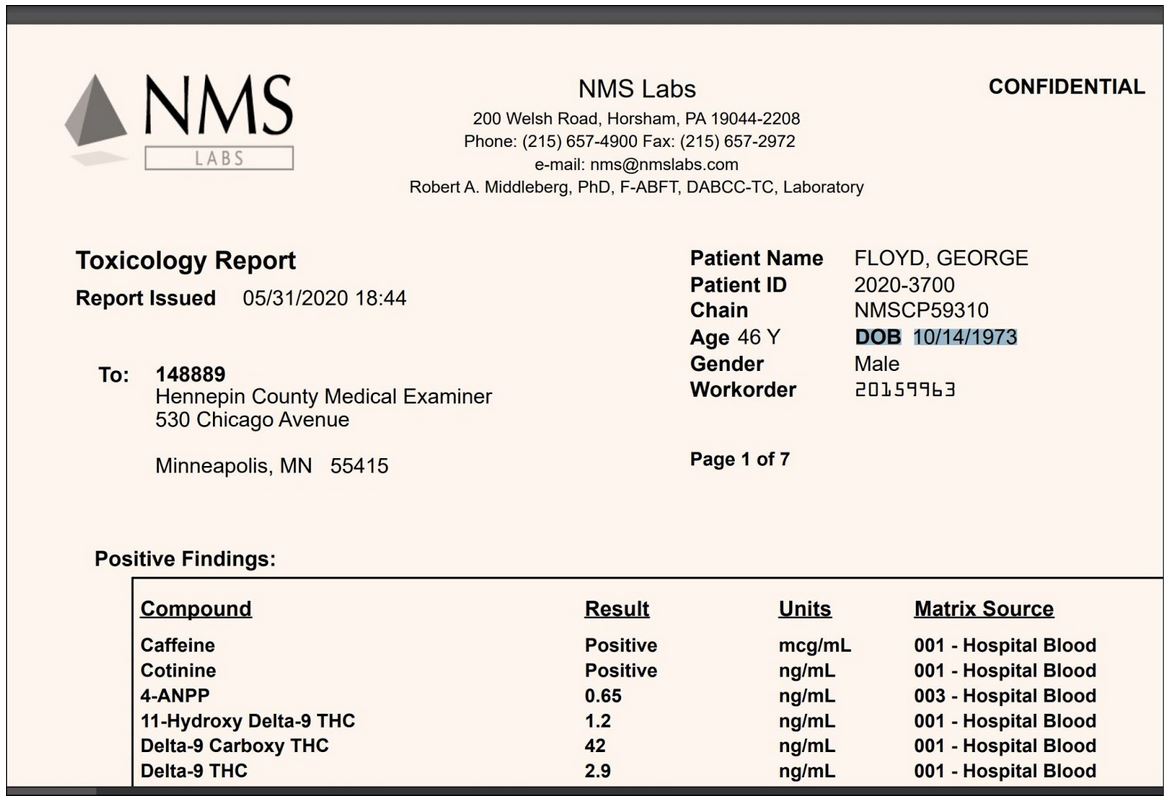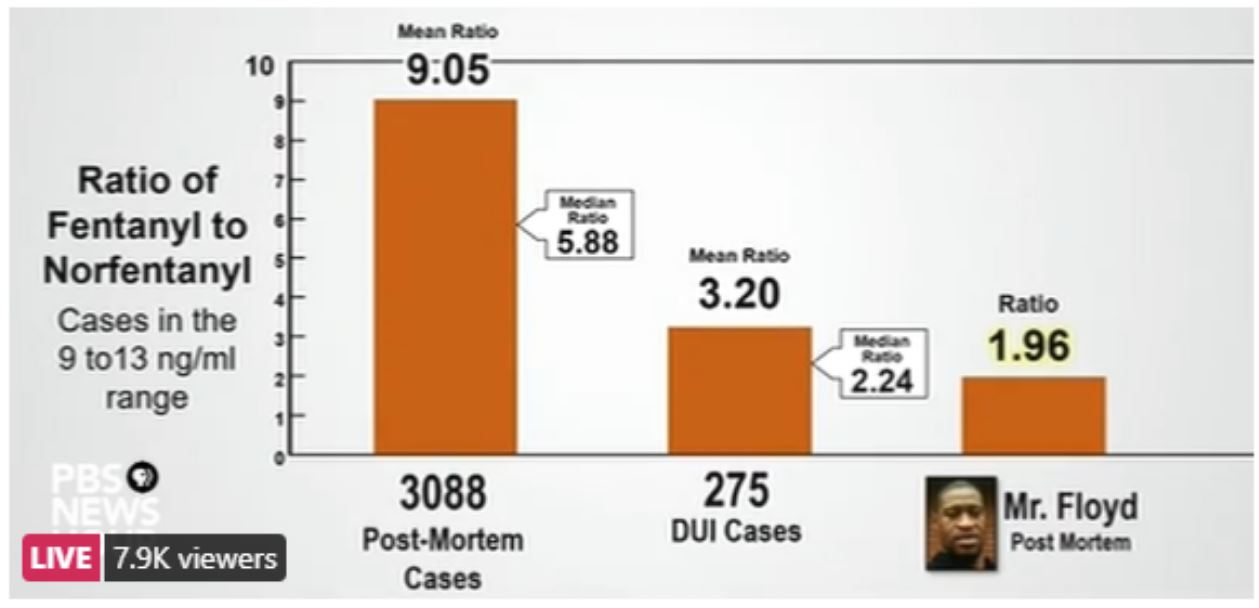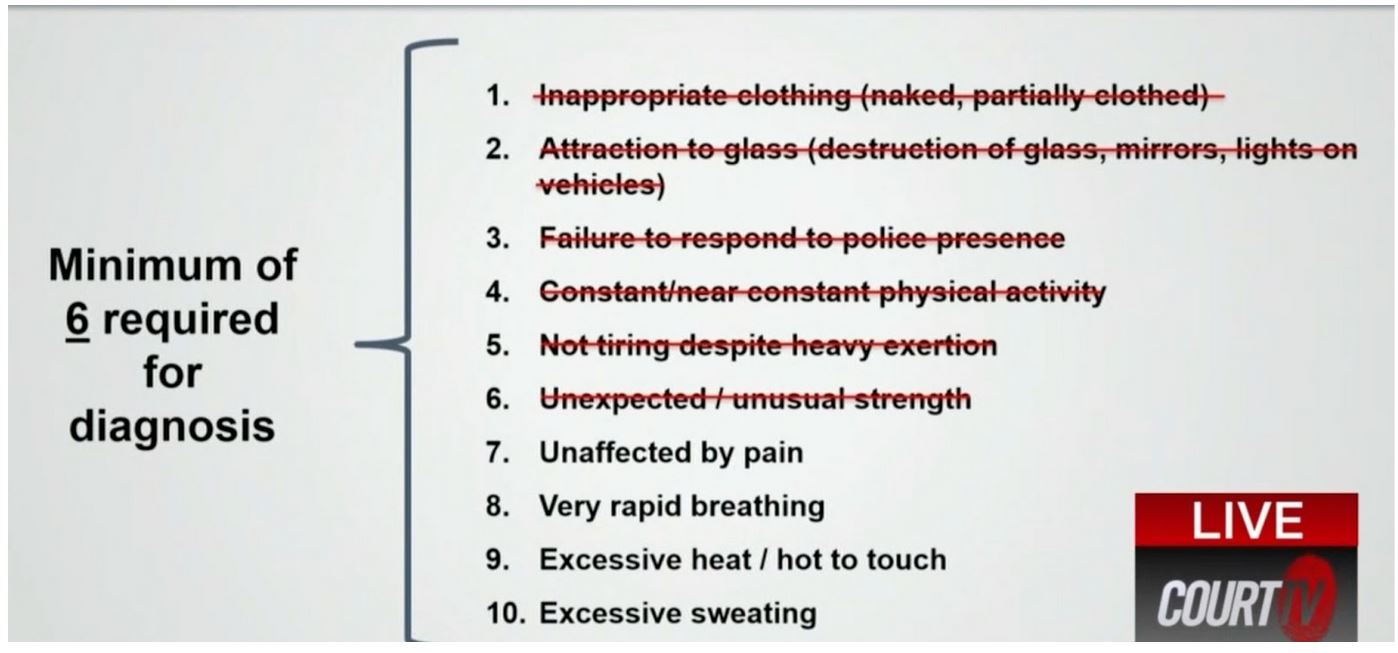The prosecution is painting the picture that George Floyd was a struggling victim of opiate addiction, aiming for sobriety.
On Day 9, The prosecution continued to maintain that the cause of death was the excessive force of Derek Chauvin’s knee and not an overdose.
Here are some highlights:
Please follow Maryam Henein on Twitter
You can support her work on Patreon
Follow Maryam on Telegram and Gab
Daniel Isenschmid
Following a three-hour testimony from Dr. Martin Tobin was forensic toxicologist of NMS Labs Daniel Isenschmid, whose PA lab-tested Floyd’s blood and urine, collected following the events of May 25th.
During the afternoon, jurors heard from a forensic toxicologist at NMS Labs, which tested Floyd’s blood for illicit drug use and found the presence of fentanyl and methamphetamine.
David Isenschmid said that while fentanyl was found in Floyd’s blood, so was norfentanyl, which is metabolized fentanyl. Overdose victims who die rarely have norfentanyl in their blood, he said.
He testified that Floyd’s ratio of fentanyl to norfentanyl was 1.96. This is compared to the average ratio of 9.05 nanograms per milliliter in postmortem cases and 3.2 ng/ml in driving under the influence cases of people who survive.
Floyd’s level of methamphetamine was even lower compared to a sample of driving under the influence meth cases.
“Does this show Mr. Floyd was below the average and even below the median in DUI cases?” prosecutor Erin Eldridge asked.
“Yes,” he said.
The lab concluded that some of the fentanyl was pre-existing.
Dr. Bill Smock
The next witness was a police surgeon of the Louisville Police Department. He’d reviewed various videos from Floyd’s arrest and case records and also expressed that Floyd died from a lack of oxygen and not from a fentanyl overdose.
Smock, who regularly responds to crime scenes and emergency rooms, said that people who overdose on fentanyl become among other things sleepy, snore, have constricted pupils and their breathing rate falls.
Smock said Floyd was not snoring, had dilated pupils, and was talking and saying “I can’t breathe.”
The doctor said “that is not a fentanyl overdose. That is someone begging to breathe.”
Consider, however, that his blood does show a speedball combo, meaning uppers and downers. And that pals Morries Lester Hall and Shawanda Hill said that Floyd had initially fallen asleep in the car after their visit concluded at Cup Foods.
Excited Delirium Denounced
Smock went through the characteristics, illustrating that Floyd didn’t show signs of “excitable delirium,” a suspicion based on his erratic behavior. Thomas Lane, a rookie, mentioned excited delirium as a possibility. It was more of a question, and consider also he was a rookie with a lack of experience.
Smock also agreed CPR should have been done as soon as they couldn’t find a pulse.
Nelson’s cross-exam looked at Floyd’s health conditions including Covid19, which in this instance had no impact on the respiratory system. Amazing.
Smock agreed Floyd had cardiovascular disease, a severe blockage in an artery, high blood pressure, as well as fentanyl and methamphetamine in his system. He also agreed struggling can stress the heart.
The prosecution contends Floyd died of asphyxia, or lack of oxygen because Chauvin knelt on his neck. Nelson, on the other hand, argues that Floyd died of a cardiac arrest resulting from illicit drug use and ongoing health problems, including heart disease and high blood pressure.
The prosecution intends to call Dr. Andrew Baker, the Hennepin County medical examiner who performed the initial autopsy. Famed Pathologist Michael Baden also conducted an autopsy but it’s not being considered in this trial and the mainstream media has said on record now that it was the “only autopsy” performed. Perhaps it was and Baden never really inspected the actual body.
Baker ruled Floyd’s cause of death as cardiac arrest, namely “cardiopulmonary arrest complicating law enforcement subdual, restraint, and neck compression.” He also listed heart disease and drug use along with “other significant conditions.”
He also listed hardening and thickening of the artery walls, heart disease, and drug use as “other significant conditions.” Fentanyl and methamphetamine were also found in Floyd’s system.
Breahna Giles
Breahna Giles, a forensic scientist with drug chemistry section of the BCA, was number 29.
Nelson asks about other substances potentially found in the car.
“There were indications of other substances. I can’t speak to if they were controlled or uncontrolled substances.”
She resisted saying the word “fentanyl.” She literally paused and refused to say the word. Some stated that she would have been more credible if she would have admitted there was trace amounts or whatever amount turned up.
Nelson asks about other substances potentially found in the car.
Susan Neith
The last witness of the day was #30, NMS Labs in Pennsylvania. Susan Neith is a forensic chemist who re-tested three pills the BCA sent her from the console of the Mercedes — the SUV Floyd was driving.
NMS Labs provides “clinical and forensic toxicology, endocrinology, and criminalistics laboratory services,” according to its website.
The trial resumes Friday.
You can read reports from past trial days at Maryam Henein’s article archive HERE.
You can read reports from past trial days at Maryam Henein’s article archive HERE.
Become a Patron!
Or support us at SubscribeStar
Donate cryptocurrency HERE
Subscribe to Activist Post for truth, peace, and freedom news. Follow us on Telegram, SoMee, HIVE, Flote, Minds, MeWe, Twitter, Gab and Ruqqus.
Provide, Protect and Profit from what’s coming! Get a free issue of Counter Markets today.







Be the first to comment on "Prosecution Witnesses Continue to Denounce Excited Delirium And Fentanyl Overdose"